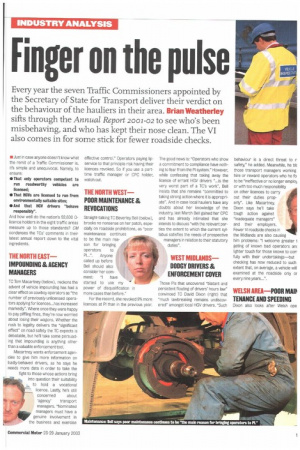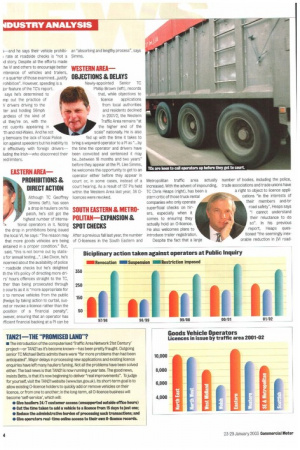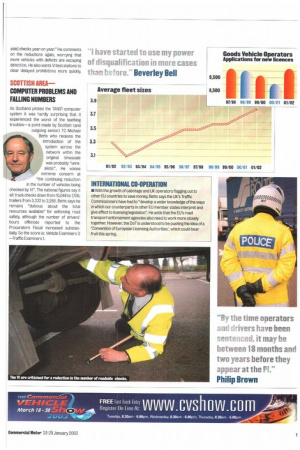Finger o the pulse
Page 13

Page 14

Page 15

If you've noticed an error in this article please click here to report it so we can fix it.
Every year the seven Traffic Commissioners appointed by the Secretary of State for Transport deliver their verdict on the behaviour of the hauliers in their area. Brian Weatherley sifts through the Annual Report 2001-02 to see who's been misbehaving, and who has kept their nose clean. The VI also comes in for some stick for fewer roadside checks.
• Just in case anyone doesn't know what the remit of a Traffic Commissioner is, it's simple and unequivocal. Namely, to ensure: • That only operators competent to run roadworthy vehicles are licensed; • That Has are licensed to run from environmentally suitable sites; • And that HGV drivers "behave responsibly".
And how well do the nation's 52,600 0licence holders in the eight traffic areas measure up to those standards? CM condenses the TCs' comments in their latest annual report down to the vital ingredients.
THE NORTH EAST— IMPOUNDING & AGENCY MANAGERS
TO Tom Macartney (below), reckons the advent of vehicle impounding has had a clear effect on cowboy operators as "the number of previously-unlicensed operators applying for licences...has increased markedly". Where once they were happy to pay piffling fines, they're now worried about losing their wagons. Whether the rush to legality delivers the "significant effect" on road safety the TC expects is debatable, but he'll take some persuading that impounding is anything other than a valuable enforcement tool. Macartney wants enforcement agencies to give him more information on badly-behaved drivers, as he says he needs more data in order to take the fight to those whose actions bring into question their suitability to hold a vocational licence. Lastly, he's still concerned about 'agency' transport managers. "Nominated managers must have a genuine involvement in the business and exercise effective control." Operators paying lipservice to that principle risk having their licences revoked. So if you use a parttime traffic manager or CPC holder, watch out.
THE NORTHWEST— POOR MAINTENANCE & REVOCATIONS
Straight-talking TC Beverley Bell (below), brooks no nonsense on her patch, especially on roadside prohibitions, as "poor maintenance continues to be the main reason for bringing operators to PI...". Anyone called up before Bell should also consider her comment: "I have started to use my power of disqualification in more cases than before."
For the record, she revoked 9% more licences at PI than in the previous year. The good news is: "Operators who show a commitment to compliance have nothing to fear from the PI system." However, while confessing that taking away the licence of errant HGV drivers "...is the very worst part of a IC's work", Bell insists that she remains "committed to taking strong action where it is appropriate". And in case local hauliers have any doubts about her knowledge of the industry, last March Bell gained her CPC and has already intimated that she intends to discuss "with the relevant parties the extent to which the current syllabus satisfies the needs of prospective managers in relation to their statutory duties".
WEST MIDLANDS— DODGY DRIVERS & ENFORCEMENT COVER
Those Pis that uncovered "blatant and persistent flouting of drivers' hours law" convinced TO David Dixon (right) that "much lawbreaking remains undiscovered" amongst local HGV drivers. "Such behaviour is a direct threat to r safety," he added. Meanwhile, he bk those transport managers working hire or reward operators who he fo to be "ineffective or no longer emplo} or with too much responsibility on other licences to carry out their duties prop erly". Like Macartney, Dixon says he'll take tough action against "inadequate managers" and their employers. Fewer VI roadside checks in the Midlands are also causing him problems: "I welcome greater I geting of known bad operators are lighter touch for those known to corr fully with their undertakings—but checking has now reduced to such extent that., on average, a vehicle will examined at the roadside only or every nine years...".
WELSH AREA—POOR MAIP TENANCE AND SPEEDING
Dixon also looks after Welsh ape 3—and he says their vehicle prohibi i rate at roadside checks is "not a id story. Despite all the efforts made he VI and others to encourage better ntenance of vehicles and trailers,
r a quarter of those examined..justify rohibition". However, speeding is a Or feature of the TC's report. says he's determined to mp out the practice of V drivers driving to the ter and holding 56mph Ardless of the kind of id they're on, with the rst culprits appearing in -th and mid-Wales. And he not y bemoans the lack of local Police ion against speeders but his inability to ii effectively with foreign driversluding the Irish—who disconnect their ied limiters.
EASTERN AREA
0 PROHIBITIONS & DIRECT ACTION Although TC Geoffrey Simms (left), has seen a drop in hauliers on his patch, he's still got the highest number of interna
% tional operators in it. Noting the drop in prohibitions being issued the local VI, he says: "The reason may that more goods vehicles are being untamed in a proper condition." But, said, "this is not borne out by statis s for annual testing...". Like Dixon, he's ncerned about the availability of police roadside checks but he's delighted th the VI's policy of directing more drirs' hours offences straight to the TC, ther than being prosecuted through a courts as it is "more appropriate for a to remove vehicles from the public lhways by taking action to curtail, sus;rid or revoke a licence rather than the position of a financial penalty". )wever, ensuring that an operator has tficient financial backing at a PI can be an 'absorbing and lengthy process", says Simms.
WESTERN AREAOBJECTIONS & DELAYS
Newly-appointed Senior IC Phillip Brown (left), records that, while objections to licence applications from local authorities and residents declined in 2001/2, the Western Traffic Area remains "at the higher end of the scale" nationally He is also fed up with the time it takes to bring a wayward operator to a PI as "...by the time the operator and drivers have been convicted and sentenced it may be...between 18 months and two years" before they appear at the Pl. Like Simms, he welcomes the opportunity to get loan operator either before they appear in court or, in some cases, instead of a court hearing. As a result of 137 Pls held within the Western Area last year, 38 0licences were revoked.
SOUTH EASTERN & METROPOLITAN-EXPANSION & SPOT CHECKS
After a previous fall last year, the number of 0-licences in the South Eastern and Metropolitan traffic area actually increased. With the advent of impounding, TC Chris Heaps (right), has been a stern critic of those truck rental companies who only operate superficial checks on hirers, especially when it comes to ensuring they actually hold an 0-licence. He also welcomes plans to introduce trailer registration.
Despite the fact that a large number of bodies, including the police, trade associations and trade unions have a right to object to licence applications "in the interests of their members and/or road safety", Heaps says "I cannot understand their reluctance to do so". In his previous report, Heaps questioned "the seemingly inexorable reduction in NI road side] checks year-on-year." He comments on the reductions again, worrying that more vehicles with defects are escaping detection. He also wants VI test stations to clear delayed prohibitions more quickly.
SCOTTISH AREA— COMPUTER PROBLEMS AND FALLING NUMBERS
As Scotland piioted the TAN21 computer system it was hardly surprising that it experienced the worst of the teething troubles—a point made by Scottish (and outgoing senior) TC Michael Betts who reckons the introduction of the system across the network within the original timescale was probably "unre alistic". He voices extreme concern at "the continuing reduction in the number of vehicles being checked by VI". The national figures say it all: truck checks down from 10,048 to 7,106; trailers from 3,232 to 2,268. Betts says he remains 'dubious about the total resources available" for enforcing road safety, although the number of drivers' hours offences reported to the Procurators Fiscal increased substantially. So the score is: Vehicle Examiners 0 —Traffic Examiners 1.




























































































































































